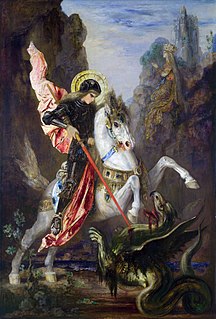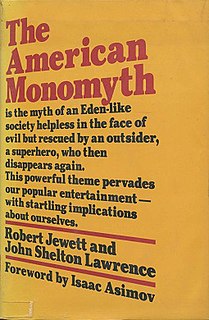
Christian mythology is the body of myths associated with Christianity. The term encompasses a broad variety of legends and stories, especially those considered sacred narratives. Mythological themes and elements occur throughout Christian literature, including recurring myths such as ascending to a mountain, the axis mundi, myths of combat, descent into the Underworld, accounts of a dying-and-rising god, flood stories, stories about the founding of a tribe or city, and myths about great heroes of the past, paradises, and self-sacrifice.

Joseph John Campbell was an American professor of literature at Sarah Lawrence College who worked in comparative mythology and comparative religion. His work covers many aspects of the human experience. Campbell's best-known work is his book The Hero with a Thousand Faces (1949), in which he discusses his theory of the journey of the archetypal hero shared by world mythologies, termed the monomyth.

A superhero or superheroine is a stock character that possesses abilities beyond those of ordinary people, who typically uses his or her powers to help the world become a better place, or is dedicated to protecting the public, and fighting crime. Superhero fiction is the genre of fiction that is centered on such characters, especially in American comic books since the 1930s, as well as in Japanese media since the 1930s.

James Tiberius Kirk is a fictional character in the Star Trek media franchise. Originally played by actor William Shatner, Kirk first appeared in Star Trek: The Original Series serving aboard the starship USS Enterprise as captain. Kirk leads his crew as they explore new worlds, new civilizations, and "boldly go where no man has gone before". Often, the characters of Spock and Leonard McCoy act as his logical and emotional sounding boards, respectively. Captain Kirk has been portrayed in numerous films, books, comics, webisodes, and video games.

The Hero with a Thousand Faces is a work of comparative mythology by Joseph Campbell, in which the author discusses his theory of the mythological structure of the journey of the archetypal hero found in world myths.

The Power of Myth is a book based on the 1988 PBS documentary Joseph Campbell and the Power of Myth. The documentary was originally broadcast as six one-hour conversations between mythologist Joseph Campbell (1904–1987) and journalist Bill Moyers. It remains one of the most popular series in the history of American public television.

Mythopoeia is a narrative genre in modern literature and film where a fictional or artificial mythology is created by the writer of prose or other fiction. This meaning of the word mythopoeia follows its use by J. R. R. Tolkien in the 1930s. The authors in this genre integrate traditional mythological themes and archetypes into fiction.

In narratology and comparative mythology, the hero's journey, or the monomyth, is the common template of stories that involve a hero who goes on an adventure, is victorious in a decisive crisis, and comes home changed or transformed.

A superhero film is a film that focuses on the actions of superheroes: individuals who usually possess extraordinary – generally superhuman – abilities and are dedicated to protecting the public. These films typically feature action, adventure, fantasy or science fiction elements, with the first film of a particular character often including a focus on the origin of their special powers and their first confrontation with their most famous supervillain or archenemy.
Matthew Wilhelm Kapell is a historian and anthropologist, with Master's Degrees in each discipline, who has a Ph.D. in American Studies.

Jacking In to the Matrix Franchise: Cultural Reception and Interpretation is a book about The Matrix trilogy of films and other associated media. It was published by Bloomsbury Academic on 1 June 2004 and edited by Matthew Kapell, anthropological historian, and William G. Doty, professor emeritus of religious studies and religion at the University of Alabama. A second printing was published in September 2006, essentially the same volume with a new cover.

The American Monomyth is a 1977 book by Robert Jewett and John Shelton Lawrence arguing for the existence and cultural importance of an 'American Monomyth', a variation on the classical monomyth as proposed by Joseph Campbell.
Mythic fiction is literature that is rooted in, inspired by, or that in some way draws from the tropes, themes and symbolism of myth, legend, folklore, and fairy tales. The term is widely credited to Charles de Lint and Terri Windling. Mythic fiction overlaps with urban fantasy and the terms are sometimes used interchangeably, but mythic fiction also includes contemporary works in non-urban settings. Mythic fiction refers to works of contemporary literature that often cross the divide between literary and fantasy fiction.

The Myth of the American Superhero is a scholarly nonfiction book by Robert Jewett and John Shelton Lawrence.
Jediism is a philosophy mainly based on the depiction of the Jedi characters in Star Wars media. Jediism attracted public attention in 2001 when a number of people recorded their religion as "Jedi" on national censuses.
Myth is a folklore genre consisting of narratives that play a fundamental role in a society, such as foundational tales or origin myths. The main characters in myths are usually non-humans, such as gods, demigods, and other supernatural figures. However, others also include humans, animals, or combinations in their classificiation of myth. Stories of everyday human beings, although often of leaders of some type, are usually contained in legends, as opposed to myths. Myths are sometimes distinguished from legends in that myths deal with gods, usually have no historical basis, and are set in a world of the remote past, very different from that of the present.

"Superduperman" is a satirical story by Harvey Kurtzman and Wally Wood that was published in the fourth issue of Mad. Lampooning both Superman and Captain Marvel, it revolutionized the types of stories seen in Mad, leading to greatly improved sales. Writers such as Alan Moore have cited this story as an influence.
William G. Doty (1939–2017) was an American religious studies scholar and educator. He an author and editor known for his writings about myth and mythology.

In narratology and comparative mythology, the Rank–Raglan mythotype is a set of narrative patterns proposed by psychoanalyst Otto Rank and later on amateur anthropologist Lord Raglan that lists different cross-cultural traits often found in the accounts of heroes, including mythical heroes.

Superman (Kal-El) or Clark Kent is a fictional character portrayed by Christopher Reeve in the Warner Bros. Superman film series produced by Ilya and Alexander Salkind, and is an adaption of the original comic book character, Superman. Many actors were interviewed for the part before Christopher Reeve was chosen to fill the role. Superman is portrayed as a superhero who stands for "truth, justice and the American way".













